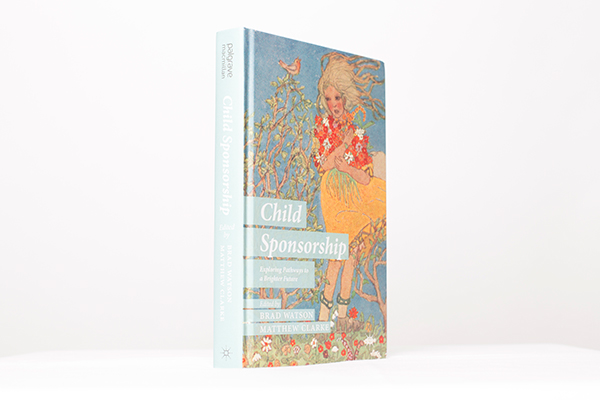Academic’s book first to critique billion-dollar industry
A book co-edited by an Avondale academic is the first to objectively critique one of the most enduring and important flows of humanitarian aid.
Brad Watson is a contributor to almost half of the 15 chapters in Child Sponsorship: Exploring Pathways to a Brighter Future, which launched in Ladies Chapel this past Saturday (September 6). The senior lecturer in international development studies in the School of Humanities and Creative Arts co-edited the book with his PhD supervisor, Professor Matthew Clarke, head of the School of Humanities and Social Sciences at Deakin University. At 272 pages, and published by Palgrave Macmillan, the book uses contributions from other academics and practitioners to explore the origins, the controversy, the diversity and the challenges of child sponsorship.
The launch, presented by Avondale and Sydney Adventist Forum, featured a panel of representatives from the Adventist Development and Relief Agency (ADRA), Asian Aid, Baptist World Aid and Compassion. Robyn Priestley, a forum committee member, reflects on the discussion.
With billions of dollars raised for millions of children, child sponsorship is a significant source of humanitarian aid. The money supports child welfare and poverty reduction, linking geographically distant benefactors to children in developing countries and disadvantaged communities. Child sponsorship began in Europe in 1919, but there has been little assessment of its claim to bring positive change. Child Sponsorship: Exploring Pathways to a Brighter Future now provides an objective critique of the value of this form of aid.
During the 1980s and 90s, journalists accused some child sponsorship entities of employing “poverty porn” in their marketing, misleading their supporters and wasting money on overheads. Professor Alistair Sim, global program effectiveness research director for Compassion International, which has been involved with child sponsorship for 60 years, referred to these criticisms while responding to questions about truthfulness in marketing. He explained Compassion is still able to support children directly by partnering with churches in areas where the children live. In response to questions about the effectiveness of its programs, he reported on a study by the University of San Francisco that demonstrated the success in nurturing children to leadership in all levels of society.
Harwood Lockton, former head of international programs at ADRA Australia, raised one of the most fundamental issues in the book—one-to-one support of children is often less effective than helping their families and communities. ADRA has always taken a community approach to aid rather than a child sponsorship approach, and Harwood expressed satisfaction that some other entities are realising this approach is more sustainable.
Rebecca Hunter, program manager Nepal and child focused initiatives for Asian Aid Australia, noted that her entity is looking at ways to maintain the work it has established over many years while promoting wider community development.
Chief executive officer John Hickey confirmed Baptist World Aid has always had community-based programs and has developed aspects of its child sponsorship program so it functions more within that framework. He stressed the need for ethical marketing for support of all humanitarian work and emphasised that as Christians we are motivated to help the poor and think beyond our community with a heart of compassion as followers of Jesus. He also made the plea that as Christians we engage fully with the causes of global poverty and be a voice for change in how we consume.
All the panellists emphasised that in humanitarian aid there are no easy answers but the one certain thing is that the focus should always be on the beneficiaries rather than on the donors.
Share

